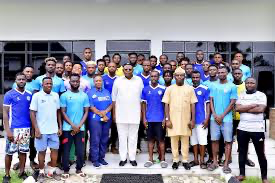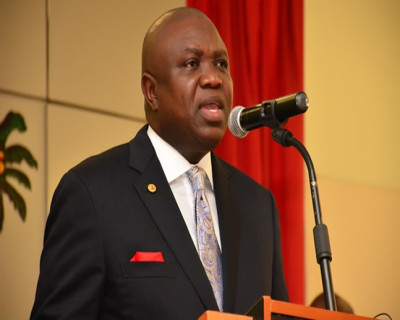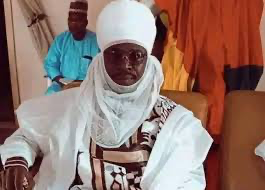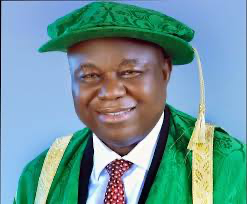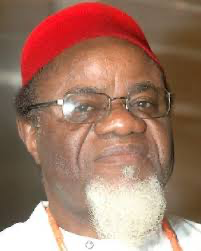New Telegraph Thursday back page of July 21, 2022
By Ike Abonyi
“It is not the qualified voters, but the qualified voters who choose to vote, that constitute political power.” – Abraham Lincoln
The first black US President Barack Obama aptly captured the power of the ballot box when he said: “Vote! Voting is the best revenge.”
Anyone familiar who remembers the cloak-and-dagger games that played out in Osun State in the election of 2018 will appreciate the full meaning of the Obama quote in the opening paragraph.
Senator Ademola Adeleke [now governor designate, God willing] of the Peoples Democratic Party, PDP, was winning at the polls in 2018 against Gov. Adegboyega Oyetola [then candidate] of the All Progressives Congress, APC, when the Independent National Electoral Commission, INEC, aborted the process, halted the election, and ordered a rerun in some areas, eventually manipulating the outcome.
Of course, the outcome of the rerun infuriated everyone, including the international observers from the US, UK, and European Union who publicly and jointly aired their discontent, saying, “The missions of the United States, the European Union, and the United Kingdom have faulted the supplementary election held in Osun State.”
According to the missions, which observed the polls, incidents noted during the process are very worrisome.
“We witnessed what appeared to be incidents of interference and intimidation of voters and heard reports of harassment of party monitors, journalists, and domestic observers.” The US Consul-General John Bray, who spoke on behalf of the missions, told journalists, “We are very concerned by these reports and we will be checking with stakeholders to determine the facts. We call on all stakeholders to remain calm.”
Despite the international outcry, the APC candidate was sworn in to rule. But four years after enjoying the hijacked mandate, Oyetola returned to seek a second term and found the same challenger Adeleke in the field of play; what happened was sweet, the revenge was apparent despite the so-called incumbency advantage of the APC man.
As would be expected, reactions to last Saturday’s victory of the PDP candidate Senator Adeleke have been coming in various forms. For the Adelekes, it is a reward for resilience and strength of character after being flagrantly robbed in 2018 through the manipulations of the electoral umpire. A lot of others in such a situation would have been frustrated out of their ambition, thereby abandoning the project.
To the Minister of Interior and erstwhile Governor of Osun State, Rauf Aregbesola, and his APC faction in the state, it is a deserving punishment for disloyalty and disrespect. To the PDP presidential candidate Atiku Abubakar, it is a ray of hope and an opening to the invincible South West ahead of 2023.
To the Jagaban, the APC presidential candidate whose land of birth is widely speculated to be Iragbiji in Osun State, it is a huge setback for the life ambition to rule Nigeria from the Aso Rock Villa. Among the religious bigots [for Muslims], it is a disturbing signal that the one-faith ticket to the Aso Rock Villa may hit the rocks.
To the Christians, the Osun outcome is a warning shot to the ruling party for taking things for granted. To the voters generally, it is a huge reminder of the potential intrinsic in having your PVC and turning out to vote on election day. The reactions are as divergent as the number.
Perhaps, the larger credit for the outcome of the Osun election should go to the amended Electoral Act which prevented such manipulations declaring an election inconclusive after an orchestrated violence which was what INEC deployed to deny Adeleke the victory of 2018.
Coming on the eve of a very dicey and potentially unpredictable general election in 2023, the Osun State results in the act as the forerunner, heralding what is to come. The biblical John the Baptist certainly was not the Messiah but he sensitised the people of then-coming messianic and gave insight into what the saviour would look like. That harbinger role is what the Osun polls represented all but one.
The haughty character displayed by the ruling party in the state and underscored by candidate Tinubu before the election was evident that they were living in the past, not knowing that 2018 and 2022 are worlds. The APC flag bearer had referred to the opposition parties as mushrooms and the Labour Party in particular (in a direct dig at Peter Obi, the political wave of the moment). He proceeded to curse…they will labour until they die.
Although an experienced politician and warrior of sorts in his own right, Jagaban said that he is not a student of Theodore Roosevelt, the 26th US President, who said, “It is only through labour and painful effort, by grim energy and resolute courage, that we move on to better things.” Ironically, when Tinubu voiced the invective, he received some clapping and cheering from the audience, ostensibly because he was addressing an already converted audience.
As the British journalist and essayist Eric Arthur Blair, more known by his pen name George Orwell, noted, “Political language… is designed to make lies sound truthful and murder respectable, and to give an appearance of solidity to pure wind.”
What happened less than 72 hours after Tinubu’s acidic and mordant remarks spoke volumes about where power resides in politics…with those who show up to vote, not with those at the rally. Fearlessness of those with PVC and who show up at the polling centre can be maddening to those who abuse power.
Both candidate Tinubu and Governor Oyetola can confirm this. The opposition, including the Labour Party, responded to him succinctly, using the ballot because they believe in what the late Prime Minister Margaret Thatcher of the UK said, “I always cheer up immensely if an attack is particularly wounding because I think, well, if they attack one personally, it means they have not a single political argument left.”
In truth, the squabbling APC in Osun State was drowning and had nothing left to offer the electorate, hence the resort to abuse and blocking of public spaces for use by the opposition.Already, the outcome of July 16, 2022, gubernatorial election has sent political gladiators of all parties to the drawing table for re-strategizing because the election has sent more than a hint of what is to come in 2023.
The election sent out a clearer message that performance and antecedents, candidates, not parties, will be the determining factors in the general elections.The INEC, political parties, their candidates, and other critical stakeholders have a lesson or two to pick from Osun. Therefore, if you call the Osun State gubernatorial election the political appetiser to help stimulate our appetite ahead of 2023 you might not be wrong.
The 2023 general elections, particularly the presidential election on February 25, are going to be a watershed, a determining election in many ramifications. In all previous Nigerian elections from 1999 through to 2003, 2007, 2011, 2015, and 2019, it always almost seemed like a turning point, a make or mar poll but never was.
The coming elections will stand out beyond make or mar; it may change the political landscape of Nigeria. It is already appearing as a vote for the survival of the country, an election like no other. It will address many vexing and befuddling issues of our clime. The real voting strengths of ethnic and religious groups may be determined this time.
Ditto the influence of modern technology in our political evolution will also be resolved, to ascertain what and who constitutes a political structure, the voting populace or hifalutin personalities, individuals, and the moneybags.
The 2023 election may not measure up to a revolution but it will stand out as one of the most dramatic moves to dismantle the unprogressive old order in favour of a new system. The signs are ubiquitous that the 2023 general election may stir up new political defiance.
If the emerging scenario is related to a revolution, it’s not just name-calling to push up something but a clear reading of what revolution means. An organised movement aimed at effecting change–economic change, technological change, political change, or social change. And just like we are seeing and hearing, the people who start revolutions in history have always determined the institutions currently in place in society have failed or no longer serve their intended purpose.
Do we need a soothsayer then to confirm that institutions currently in place in Nigeria have all woefully failed and no longer serve their purposes of nurturing and growing the lofty goals of our forefathers?
However the 2023 presidential election goes, whether re-installing or upturning the old order, it is expected to produce an enduring consequence that is almost certain to change our society for the better.
May God help us.
